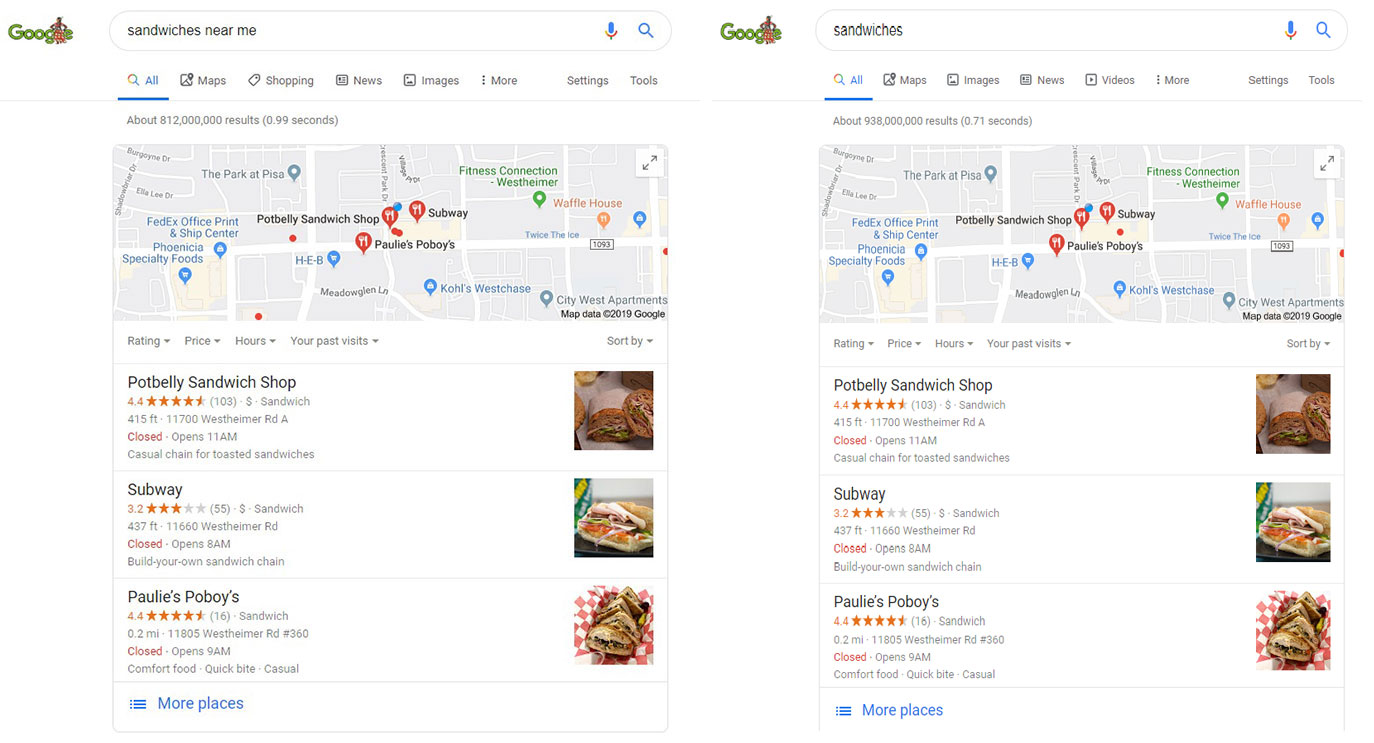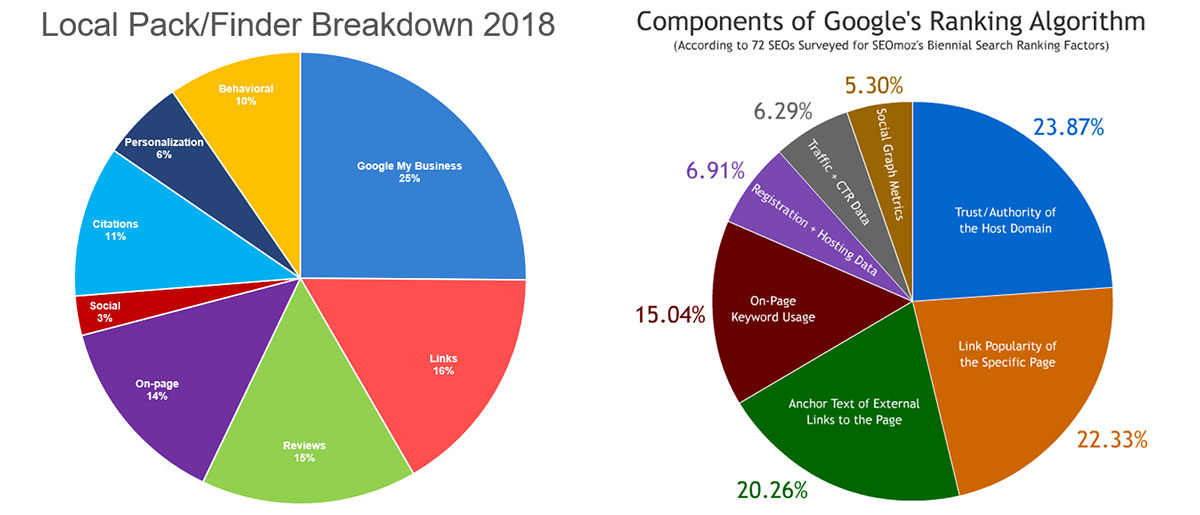Those in the world of marketing may have heard of local and organic SEO – you included. However, many don’t know the difference between both. And what’s even worse is, many don’t bother looking up the differences. This is dangerous, as the understanding the differences is vital to your online marketing. And today, we’ll clarify that. We’ll discuss the differences between both. We’ll define each, plus the businesses suitable for each SEO approach!
Local SEO: Definition.
The difference between local SEO and organic SEO is simple. It all comes down to a geography. You see, search engines look at a lot when before giving you search results. And of the one main factors they look at is your “location.” Let’s explain this with an example.
How Local Search Works.
Let’s say you’re hungry, and you want to order food. So you Google “sandwich delivery services near me.” The search results may only show 5 (hypothetically). And they may even show up as ads on the first page. But what you’ll notice is, all of them are near your location. All of them are “SEO optimized to show up for local searches.” And that’s what local SEO is all about.

(And even if I just search for “sandwiches” Google assumes I’m looking for a nearby sandwich place.)
Local SEO in a Nutshell.
It’s where you adjust the online presence of your business so you show up in local searches. Basically, if your business is in a location, and someone searches for services offered in your niche, you might show up. In fact, optimizing your SEO for locality increases your chances of “appearing” to local clients searching you. That aside, let’s focus on the other type of optimizing, this being “organic SEO.”
What’s an Organic Search?
Search engines look at many factors. But they’re smart, and they know when locality does (or doesn’t) matter for a result. This is what an organic search result is. Here, a search engine decides that there’s no local intent, and that searchers are looking for info, independent of location. For example, searching random/general facts online doesn’t involve location. It just involves reliable sources. In those situations, Google may ignore locality all together. Another example is searching for services that are not physical (independent of location, or entirely online). For example, when searching for online games, location doesn’t factor much. The same applies when searching for e-books, etc.
Wait – How Does Google Decide What’s Local and What Isn’t?
Google uses 100s of factors in a complex algorithm that indexes sites in different ranks. Some of those factors look for a filter location, which is how such results are decided.

Who Ranks Locally or Organically?
This depends on your business model. If you operate a business with a physical location, then you’ll want to rank locally. After all, most of your clients will be in your area, and they’ll be seeking specific services/products there. Therefore, optimizing for keywords is a must. However, do note that many times, local searchers in your area are more likely to physically visit the nearest branches, instead of searching. Online local searching is usually done with the intent of home delivery. And if home delivery is what your brick and mortar business offers, then you should be online.
Alternatively…
Maybe you want your business to rank for certain terms, but without the location dependency. For example, maybe you’re running a blog. Or, maybe you’re selling an app that’s accessible internationally. If so, targeting customers without location is more likely to earn you success.
Why Does Local SEO Matter?
Here’s a fact…Around 50% of searchers will visit a business (or contact one) 24 hours after a local search. As a result, optimizing your SEO presence with locality is vital. It has much to do with location. Plus, search engines must know where your business exists. After all, when a person seeks your location,you want your business to show up when necessary.
The Details That Matter.
You want to include your business’ contact information too. Thus, you’ll want to index your phone number, address, and business name in a local listing directory, and in addition to your website. Those constitute the bare minimums for ranking locally.
As a Local Business – Should You Focus on Organic Searches?
This depends. If your business is located in multiple areas (for example, you have stores in multiple states), then organic focus may serve you well. However, you still want to balance between local ranking at multiple select locations, and organic ranking. That way, you ensure a more accurate targeting of interested customers. Also, you can try ranking organically if your business has a blog – and you use that to post regular content. For example, you may be a health professional with a clinic. Yet, you may have a blog that discusses hot topics in the healthcare industry. You can use that as a branding tactic for your business, and also as a way to sell online products. And this is all achievable through organic SEO.
Organic SEO – What is It?
This form of SEO has nothing to do with location. It also doesn’t focus on the relevancy or your site in relation to specific searches. When a site is optimized for organic searches, the goal is to let the website appear in specific search results. This may be for a short key-phrase, or even a full-size question. However, note that with organic SEO, you must use certain keywords in paragraphs and headings. You do so since Google focuses on those before regular one. Important note: (You shouldn’t overstuff paragraphs with keywords) – this may lower your search rankings.
Do Organic and Local SEO Overlap?
Some practices work at boosting both local and organic SEO. One of them is acquiring back-links through high authority websites.
Off-Site Efforts.
Getting a back-link from a major review site boosts both organic and local SEO. You can also build back-links on major news networks. You can even build them on the websites and channels of influencers, thus making your search results more trusted. Another tip is the local listing tips previously mentioned. By listing your business details, you can tell search engines your locations. This actually counts as a way to “build back-links” to your online presence. In turn, that’ll assist both local and organic SEO efforts.
On-Site Efforts.
Unlike back-linking, this focuses less on efforts done out of site. And it focuses more on what you can do within your sites (and social media pages). For starters, this’ll require you to write more blogging content. You can publish more articles, which will boost both local and organic SEO. The reason for that is, Google likes fresh content. Plus, it likes long content that showcases the expertise of the publisher. Done correctly, posting regular and lengthy content can simultaneously boost organic and local SEO rankings.
Final Word.
A word for the wise – SEO optimization is absolutely vital for your online presence. You need it for customers to find you, whether locally or not. Therefore, you need to ensure that Google can find you when you’re needed by a client. And doing so requires constant optimization of content, back-links, all while changing strategies. So don’t shy from putting your business information to the public. That way, you increase your chances of being found online!



